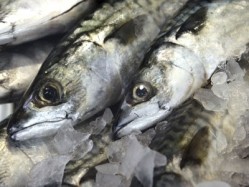Marine Conservation Society puts line-caught mackerel back on 'Fish to Eat' list

In January, the organisation caused confusion over its decision to remove all mackerel, previously promoted as a sustainable fish, from its Fish to Eat list, downgrading it to a three 'fish to eat with caution' rating in response to over-fishing of the stock in the North East Atlantic.
The move was criticised by chefs and their suppliers who sourced mackerel from outside the North East Atlantic, as they said sustainable fishing methods used in some areas such as Cornwall were not contributing to over-fishing. Some, such as Nathan Outlaw and Stephane Delorme, head chef at The Seafood Restaurant in Padstow, resolved to keep mackerel on their menus as they were confident methods used to catch it were sustainable.
Refined ratings
Late last week, in a bid to lessen confusion, the MCS announced that it was refining ratings for mackerel, giving Cornish coast line-caught mackerel a two 'fish to eat' rating, while mackerel caught by EU and Norwegian vessels in the North East Atlantic remained a 'fish to eat with caution'.
Mackerel caught in Icelandic and Faroese waters remains on the the four 'fish to avoid' rating as fishing methods in that area can not be considered sustainable, according to the MCS. Neither Iceland nor the Faeroes have agreed a long-term international management plan and their total catch is in excess of what has been scientifically recommended and previously agreed upon by all participating countries.
MCS Fisheries and Aquaculture programme manager, Jim Masters, said the revised ratings had been issued to 'reflect the current uncertain situation' around mackerel and said locally-caught fish using traditional hand-lining methods was the best choice.
"It’s without doubt the most sustainable method of fishing for mackerel and other species," he said. "It is labour intensive but produces quality fish which should attract a premium price. Any market flooded with poor quality fish that drives down both prices and sustainability is bad news for everyone.
"There appears to be no end in sight to the political tug-of-war over mackerel in the North East Atlantic, and MCS remains very concerned for the fish stocks that have been caught in the middle. These ratings better reflect the damaging effect the political stand-off is having on mackerel stocks and the wider marine environment. The political impasse is playing a dangerous game with fish stocks, resulting in the twin perils of poor fisheries management and increasing levels of by-catch."
Welcomed news
The news was welcomed by chefs and restaurateurs with Richard Corrigan and Hugh Fearnley-Whittingstall's Fish Fight campaign among those pleased with the new guidance.
At a glance - MCS Guidance on mackerel
- Best Choice: South-West hand-line caught mackerel (2)
- Best Alternative: UK / EU / Norwegian pelagic caught mackerel (3)
- Least Sustainable: Icelandic and Faroese pelagic caught mackerel (4)

































